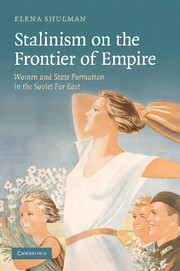Book contents
- Frontmatter
- Contents
- List of illustrations
- Acknowledgments
- Glossary
- Note on the text
- Introduction
- 1 Women and Soviet power
- 2 “Where steel cracks like glass”
- 3 “Our famous Valia”: the rise of a Soviet notable
- 4 “Envy for everything heroic”: women volunteering for the frontier
- 5 “Bol'shevichki were never ascetics!”: female morale and Communist morality
- 6 Snivelers and patriots
- Conclusion
- Appendices
- Selected bibliography
- Index
5 - “Bol'shevichki were never ascetics!”: female morale and Communist morality
Published online by Cambridge University Press: 19 July 2009
- Frontmatter
- Contents
- List of illustrations
- Acknowledgments
- Glossary
- Note on the text
- Introduction
- 1 Women and Soviet power
- 2 “Where steel cracks like glass”
- 3 “Our famous Valia”: the rise of a Soviet notable
- 4 “Envy for everything heroic”: women volunteering for the frontier
- 5 “Bol'shevichki were never ascetics!”: female morale and Communist morality
- 6 Snivelers and patriots
- Conclusion
- Appendices
- Selected bibliography
- Index
Summary
In Adres podviga – Dal'nii Vostok: Muzhestvo Komsomol'ska, a 1974 book lionizing the heroic builders of Komsomol'sk-na-Amure, a vignette about three inseparable girlfriends who went to the region as patriotic volunteers captures something of the unease about sex and marriage that seems to have existed and echoes experiences revealed in archival documents. A young woman rushes to her dormitory to tell her friends about a marriage proposal. The subsequent fictional dispute between the girls encapsulates, to a surprisingly accurate extent, the qualms about and contentious nature of sexual behavior and marriage forty years earlier. One of the friends welcomed the news, but the other, Taisa, did not hide her displeasure and exhorted, “What did we come here for? To work, build a city, study, to defend the border. What will happen if we all jump into marriage? Have you thought of that?” Her friends rejected this position as ridiculous. Taisa persisted, “I'm speaking like a revolutionary, like a Bol'shevichka …” Her friends fired back, “Bol'shevichki were never ascetics!” Taisa was undaunted. “Marriage is a sign of weakness!” The woman who planned to marry cut off the debate: “‘It is love, girls …’ she said firmly but quietly. ‘The time will come and you will fall in love.’” Eventually, all the friends married and moved out of the dormitory. The authors interjected, “And such is life. Its laws are eternal.
- Type
- Chapter
- Information
- Stalinism on the Frontier of EmpireWomen and State Formation in the Soviet Far East, pp. 149 - 186Publisher: Cambridge University PressPrint publication year: 2008

